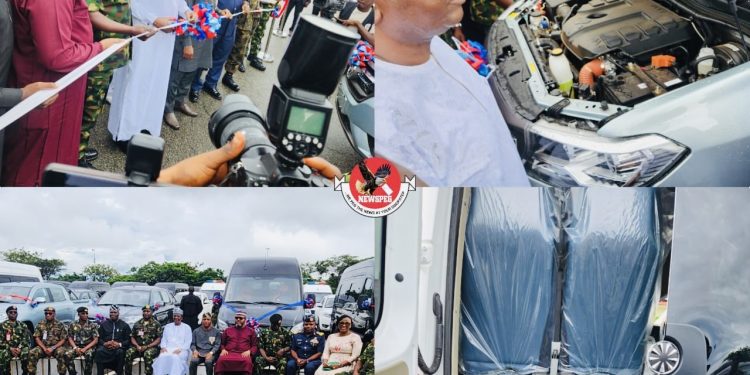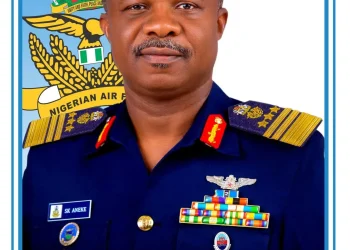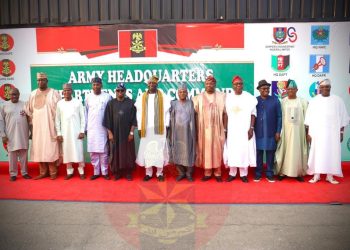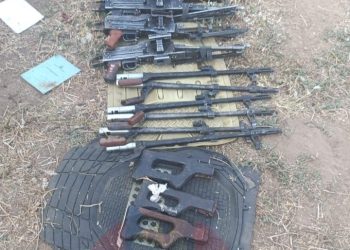By Nkechi Eze
The Defence Headquarters (DHQ) of Nigeria has formally commissioned a fleet of Compressed Natural Gas (CNG) vehicles into the logistics operations of the Armed Forces of Nigeria, marking a significant advancement in the nation’s efforts to integrate environmental sustainability into its defence infrastructure. The commissioning ceremony, held at Mogadishu Cantonment, Asokoro, Abuja, signifies a major policy shift in military mobility, energy utilization, and environmental responsibility.
The event, which brought together senior defence officials, government representatives, and key stakeholders from the energy and transportation sectors, underscored the Armed Forces’ commitment to national energy reforms and global environmental standards. The move is in furtherance of the Federal Government’s broader energy transition agenda, as articulated in President Bola Ahmed Tinubu’s Renewed Hope Agenda.
Delivering the keynote address, the Minister of State for Defence, Dr. Bello Mohammed Matawalle, MON, described the commissioning as a strategic development that reflects the Federal Government’s priorities of innovation, economic resilience, and climate-conscious governance.
“This event is more than a symbolic unveiling of vehicles; it is a clear, strategic step towards energy sustainability, economic efficiency, and environmental resilience,” Dr. Matawalle stated.
The Minister observed that the global energy landscape is shifting in response to the intensifying climate crisis, and emphasized the importance of Nigeria, rich in natural gas resources assuming a leading role in the adoption of cleaner fuels. He further stated that the integration of CNG into military logistics operations would reduce greenhouse gas emissions, lower fuel expenditure, and demonstrate innovation within public institutions.
“This is not a one-off event but the beginning of a long-term systemic change,” Dr. Matawalle declared. He also called for the establishment of CNG refueling infrastructure across all military formations and advocated for targeted technical training to equip personnel with the skills necessary for effective operation and maintenance of the new systems.
In his remarks, the Chief of Defence Staff (CDS), General Christopher Gwabin Musa, described the commissioning as a milestone in the Armed Forces’ continuing modernization agenda. He affirmed that the introduction of CNG-powered vehicles demonstrates the military’s commitment to aligning its operations with global best practices and national development goals.
“This commissioning of CNG vehicles is a bold demonstration of our readiness to support national energy goals, improve cost-effectiveness, and contribute meaningfully to national development,” General Musa stated.
The CDS also referenced the recent commissioning of 800 Amphibious Special Forces in Jaji, Kaduna State, drawing a connection between security preparedness and forward-thinking reforms in military logistics. He extended appreciation to President Tinubu for his leadership and support, as well as to the Minister of Defence and the Presidential CNG Initiative team for their strategic collaboration and technical guidance.
The Programme Director of the Presidential Compressed Natural Gas Initiative (PI-CNG), Engr. Michael Oluwagbemi, commended the Armed Forces for becoming the first government institution to adopt the CNG rollout under the Initiative. He disclosed that the Nigerian Army participated in the pilot phase of the programme and confirmed that over 5,000 vehicles are scheduled for conversion in the current phase.
“This initiative represents more than clean energy adoption; it is a statement of national leadership,” he said.
Also addressing the gathering, the Chief of Defence Logistics, Major General J.T. Ochibano, noted that the Defence Headquarters has actively partnered with the PI-CNG to drive implementation of the initiative within the military. He revealed that the Armed Forces Mechanical Engineering facility has been designated to train personnel from various security agencies in CNG vehicle operation and conversion. Additionally, he confirmed that conversion kits are being supplied under the broader PI-CNG support framework.
Providing a breakdown of assets received, Major General Ochibano stated that between November 2023 and June 2025, the Armed Forces took delivery of 20 CNG-powered buses, 10 of which have been configured as ambulances alongside 50 Jet Lander CNG pickup vehicles and 14 Jet Mover executive buses. All vehicles were on display during the ceremony.
He described the development as a “bold and commendable step” that reflects the Armed Forces’ alignment with national economic reforms and its commitment to sustainability, cost-efficiency, and innovation.
Other dignitaries present included the Permanent Secretary, Ministry of Defence, Ambassador Gabriel Tanimu Aduda; Chairman of the PI-CNG, Dr. Ismail Ahmed; senior military officers; and representatives of the service chiefs, alongside officials from the Ministries of Defence and Energy.
The commissioning of the CNG fleet is expected to significantly reduce the carbon footprint of the Nigerian Armed Forces, decrease reliance on expensive fossil fuels, and provide a model for sustainable energy adoption across the broader public sector. It marks the beginning of a transformative shift in military operations, one that integrates security imperatives with environmental consciousness in pursuit of a more efficient and responsible national defence architecture.

















